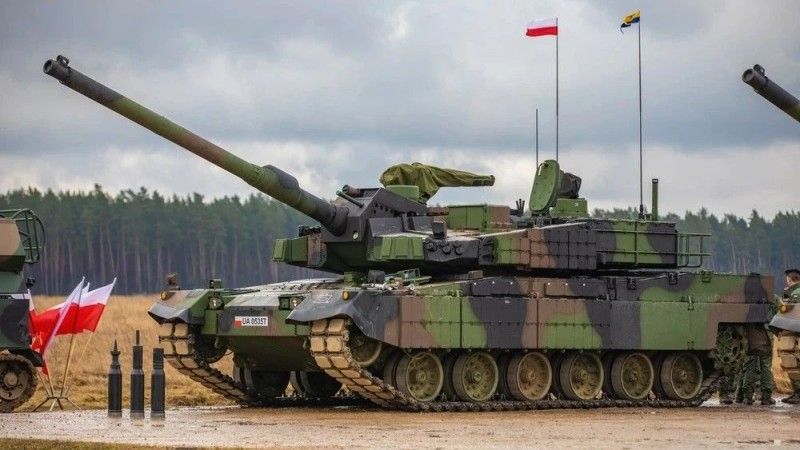Bejda: 150 Modernization Deals in 2024, 500 bn. Zlotys of Insufficient Financing for Plans

Photo. US Army
Polish Vice-Minister of Defence Paweł Bejda outlined the Ministry’s plan when it comes to the conclusion of modernization deals in 2024. He also said that the review conducted at the MoD resulted in revealing the fact that an extra PLN 500 bn. is the amount that is needed to follow up, concerning all requirements defined by the Armed Forces Development Programme.
Bejda was responding to an inquiry made by MP Radosław Lubczyk (PSL), during a parliamentary assembly. The MP was asking whether the procurement would continue and whether financing is available for the already finalized contracts.
The Secretary of State at the MoD stated that as of 13th December 2023, several agreements with a value exceeding PLN 30 bn. were concluded. During the first month of the term of office, 8 agreements were concluded, of a total value of PLN 19 bn. 18 bn. zlotys would be paid to PGZ or other Polish defence sector businesses. Bejda added that the Ministry intends to conclude at least 50% of contracts with the domestic industry.
This year 150 agreements are planned to be concluded, in the domain of varied defence procurements. Programmes related to air and missile defence systems, rocket and tube artillery, air force, and navy would be given priority.
The Vice-Minister declared that delivery contracts regarding the following have already been signed:
- P-18PL Early Detection Radars for the Narew SHORAD system
- Jelcz special-purpose platforms for Homar-K MLRS
- 155 mm munitions
- 120 mm main battle tank munitions for the Abrams MBTs
- Pontoon bridge sets for the Engineering Units
- Light Armored Reconnaissance Carriers
- Integrated IBCS Air/Missile Defence Command System for Wisła and Narew
- Carl Gustaf M4 Multi-Purpose Recoilless Rifles
Further procurement would continue, with the results of the procurement system audit taken into account. The agreements planned to be concluded in 2024 include: AH-64 Apache attack helicopters, aerostat-based aerial radar systems (recently FMS approval was granted within that regard), further main battle tanks, further Homar-A, and Homar-K MLRS assets, different helicopters, including support and multi-role platforms, unmanned reconnaissance and strike systems, F-16 MLU, main battle tank munitions, weapons inventory for the air force, or elements of the individual kit.
The Vice-Minister said that the elements of the individual kit inventory are a priority, dictated by the lessons learned from the War in Ukraine. He noted that large operational programmes were the key focus so far, while uniforms, headgear, or bulletproof vests were forgotten.
The Secretary of State at the MoD also noted that despite the prior declarations, Poland has just begun its efforts in the air defence domain, and there is a lot to be done within that scope. Further redefinition of existing needs and requirements may be expected soon. Certain actions, such as a change of the QRA system, have already been undertaken, implemented, and proven operationally. Poland will also be making efforts towards further reinforcement of the allied presence when it comes to air defences.
All agreements are being signed based on the approved Central Material Plans that contain budget financing, as well as the plans created within the framework of the Armed Forces Support Fund. Given the specific nature of that Fund, the agreements concluded with financing embedded within that fund always need to come with approval and recommendations issued by the Steering Committee, involving the Minister of Finance, Minister of National Defence, and the President of the Management Board at the BGK Bank (the so-called fund operator).
As the Minister added, the analysis of needs conducted, within the scope of the full implementation of all tasks resulting from the current Republic of Poland Armed Forces Development Programme, resulted in a discovery of insufficient financing, in an amount exceeding PLN 500 bn. „Half a trillion in the area of all Central Material Plans, namely the Technical Modernization Plan, Material Means Procurement Plan, or Construction Investment Plans”, the Vice-Minister added.
Furthermore, risks were assessed and defined, in relation to the potential limitation of the possibility of using debt instruments within the framework of the Support Fund, valued at ca. PLN 200 billion, to secure the VAT, and the so-called „Polish portion”, and also tied to the decision on acceleration of forming of the 8th Infantry Division. Here we are speaking of ca. PLN 15 bn. to secure the infrastructure investments. That would translate into another PLN 215 bn.
In the area of technical modernization, the insufficient financing stems from the necessity to allocate extra defence procurement funds, regarding the equipment for newly formed tactical elements, and other military units. As a consequence, the Polish MoD adopted relevant procedures earlier this year, making it impossible to conclude deals, without a proper financing backup. Currently, the agreements are under review, also due to the changes in the security environment, and the allied commitments.
Vice-Minister Bejda listed the “conditional” K9 howitzer performance contract concluded in December as an example of under-financing. “Many of those agreements, including framework agreements, were concluded as propaganda”, the Vice-Minister said. He added that many of the agreements were being signed without any involvement of the General Staff, but this practice is no longer pursued - the Armed Forces define the needs, while the politicians are there to procure the equipment “as good as possible, as cheap as possible, and best if that procurement is done at the Polish defence factories”. Many of the previously concluded agreements were signed “without imagination” tied to infrastructure and training - exemplified, for instance, by the FA-50 acquisition, as the support structure for that aircraft had to be prepared in parallel with the deliveries.
The Vice-Minister added that PLN 130 bn. is the amount missing, needed to cover just the VAT. He stressed that any implementation needs to be aligned with the training process as well. „It’s the end of <'ll work somehow>> approach. We place our bets on sustainable development in all domains: land, air, sea, cyber, and also space. We need to remember that the procurement steps beyond the prices associated with the contracts alone, as they also include the loan payment amounts and the amounts tied to ongoing maintenance of the procured military equipment which, in the future, would become a colossal burden for the budget of the Polish MoD”, and as Bejda noted, that burden is difficult to be clearly estimated.

WIDEO: Defence24 Days 2025: Premier Defence & Security Conference in CEE